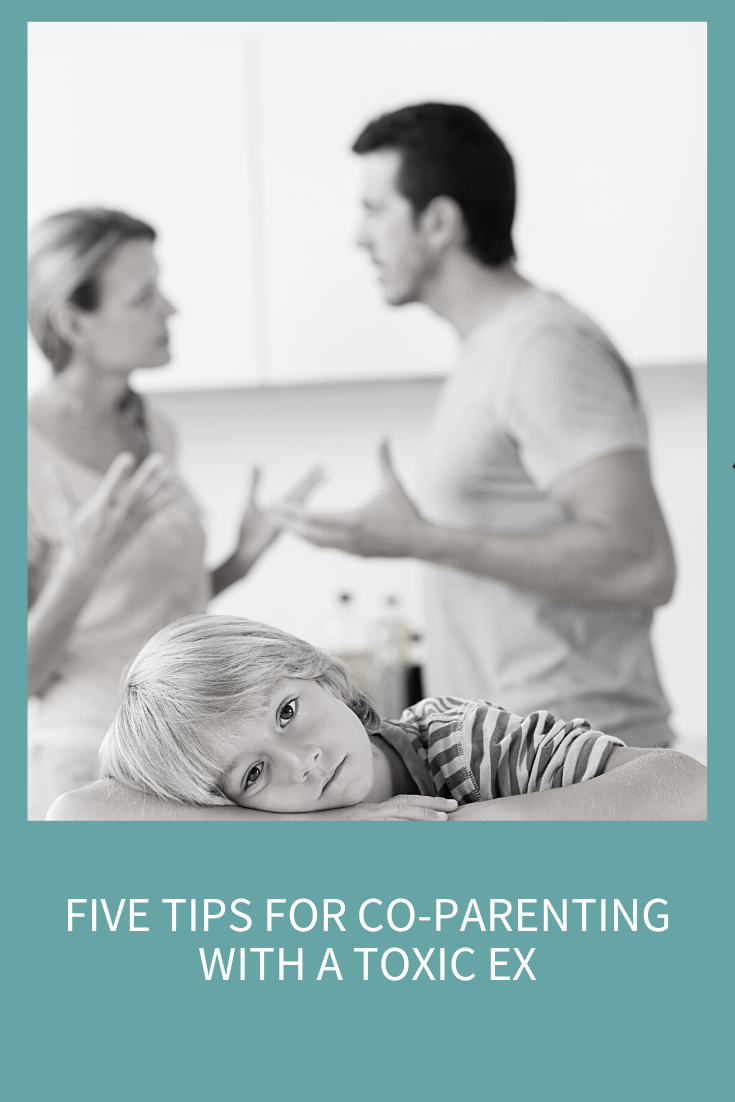
You’ve tried being easy-going and flexible, and you’ve tried being clear and firm, but nothing has worked when it comes to co-parenting with your ex, and I can tell you why: You’re trying to do the impossible. If your ex is narcissistic, abusive, controlling, rageful, or in some other way toxic, your efforts at any reasonable co-parenting will be thwarted. But you don’t need to give up because there is something you can do, and it’s called parallel parenting. Today I’m going to teach you all about the differences between co-parenting and parallel parenting and my top five tips for creating as much peace as possible.
10-minute read
What is a Toxic Ex?
A toxic ex can be a lot of things: narcissistic, controlling, abusive, passive-aggressive, jealous, possessive, or just plain mean. Having a toxic ex means this person doesn’t respect you or your boundaries. It means they’re doing everything they can to maintain some form of control in your life, and they have the perfect vehicle—the children you have together.
They want your attention and to be in charge of how you feel. They want to know that they’re still dominant in your life, despite the fact that you’ve broken up (and all of these were likely the reasons you broke up in the first place). I’m not going to go deep into narcissism or narcissistic tendencies here, so if you want to learn more about that, listen to previous episodes I devoted to dealing with a narcissist and gaslighting. For now, I’ll trust that you know your ex is toxic because you’ve been struggling with their behavior and co-parenting.
You know you’re dealing with a toxic ex because you consistently feel miserable, drained, resentful, and hopeless when you interact with them.
Having a toxic ex means you can’t co-parent because the “co” in co-parenting means “together or mutual,” and that is not something your ex cares about. Their main motivation isn’t doing what’s best for your children. Their main motivation is maintaining control over you and the situation. Their main objective is making you suffer even if that means making your children suffer, or harming them. You can’t co-parent with a toxic ex. Instead, you have to parallel parent.
What Is Parallel Parenting?
Parallel parenting is just what it sounds like: Parenting in two different spaces that don’t overlap. The focus here is on having limited interaction with your ex and clear, almost rigid, boundaries. This means lots of rules about how and when you’ll communicate and having a structured parenting plan (generally court-ordered).
When you think of co-parenting, you would work together with your ex to decide what’s best for the kids and how to mutually make that happen. You’d agree on expectations and rules so there’s consistency across the two households. With co-parenting, you’d likely communicate often, share decision-making and negotiate among yourselves when it comes to changes in schedules or the needs of your children. As you’ve likely already learned (or you wouldn’t be here with me right now), none of these reasonable, loving boundaries work when you’ve got a toxic ex.
In contrast, when you’re parallel parenting, there’s no collaboration or checking in with the other parent about things that might come up. Instead, there are rules and strict boundaries for everything, with as little direct communication as possible.
My Top Five Tips for Parallel Parenting with a Toxic Ex
Tip #1: Limit Communication Options
The majority (or all) of your communication should happen through a parenting portal and possibly email. There are a few sites (that are admissible in court) such as Our Family Wizard, Talking Parents, and 2houses. There are a few wonderful advantages to these types of sites:
- The communication on them is admissible in court, which can help prevent your ex from being abusive;
- There are features such as “read receipts” so your ex can’t claim that they never got a particular message;
- If your ex continually refuses to answer you on these apps, you can prove their non-communication in court; and
- You can note things here that you’d like to use later for court. For example, let’s say your toxic ex shit talks about you to your kids. Write about this in an email to them via one of these apps every single time it happens. I had a client do this, and eventually, their ex was court-ordered into therapy.
Email is a secondary route of communication if you find it necessary. Email is good because you still have a paper trail, although I highly recommend doing everything through the monitored apps. If your ex continues to try to contact you in other ways, you can respond via the app so, again, it can be admissible in court later (i.e., “I see that you’ve continued to try to reach out via phone/text/DM although I’ve repeatedly asked that you only communicate here on this site. I will not respond in any other format.”).
Block your ex on all social media and email accounts and increase your privacy settings. If you must email, set up a separate address for only your ex. This way, you can get yourself mentally prepared to read an email from them instead of being blindsided in your regular email box.
You’ll also need to set up rules for yourself which should include how often you’ll check the parenting apps/sites for communication and how long you’ll pause before responding. What’s your rule when your ex texts or calls you? Figure all this out and be very strict with yourself and these boundaries.
Tip #2: Expect Bullshit
One of the biggest issues I see is that people let down their guard with a toxic ex and then seem surprised when their ex is unreasonable, cruel, or annoying. You need to get yourself into a mental place where you say something like this to yourself, “My ex is mentally ill, and although I will continue to find compassion for them, I understand that I must expect them to remain exactly the same forever.”
In other words, don’t be hopeful or optimistic about your ex. Be rational and set up appropriate expectations so you’re not disappointed or blindsided. Expect your ex to try to control you by “forgetting” to bring your son’s soccer jersey or your daughter’s science textbook when the kids transfer to your house.
To combat this, you’re going to get doubles, triples, or more of everything! Pay the coaches or teams for an extra jersey, tell the school you need two sets of your kid’s textbooks, and buy multiple clothing items, lunch containers, and backpacks. Yup. You’re going to throw money at the problem for a little while in all the ways you can, so you don’t need to get pulled into conversations asking where your daughter’s cleats are. I know this can seem expensive and wasteful, but your peace of mind is worth every penny (and it’s ultimately cheaper than therapy or more court appearances). When the kids are old enough, make it their responsibility to gather the things they’ll need as they transfer houses or create lists they can work from when they’re packing up to transition.
Check out my YouTube Channel for actionable tips and tools to help you find more ease, joy, and happiness in your life and relationships!
Tip #3: Have a Court Order and Expect Them to Break It
Because you’re not co-parenting, it’s up to you to decide what you want. Write up your dream plan with your lawyer and start from there. Put everything you can think of in writing that will later become part of that court order: when you’ll have the kids exactly, who’s responsible for picking up or dropping off, what happens on the holidays (literally from what time to what time) when things like child support will be paid and so on. As much as you can, don’t have any gray areas. Make everything as explicit as possible.
Now is the hard part. Your toxic ex is almost guaranteed to ignore all or parts of the court order. If they’re supposed to drop the kids at your home at 3:00, expect drop-offs at 3:15 or even 2:30. They will absolutely break the court order in some way. Your job is to document, document, document. You can do this via the shared family app/site you’re using, and/or you can keep a separate list (speak to your lawyer about this part) and then wait until you have enough ammunition (they haven’t had the kids on their weekend for four months) to go back to court to get the court order changed. Push for sanctions and fight for sole decision-making rights or sole custody.
Doing this type of work in the first year will set you up for success in the future because you will gain more and more control of your kids, which will necessitate less access to your ex. This, in turn, will make your life happier. At the very least, your ex will have less room to try to make your life miserable, which will also mean a more peaceful life for you.
Tip #4: Hold Your Boundaries and Be Ruthlessly Consistent
I know it’s hard, and I know you just want to bow out and not let this person be such a central part of your life. But the only way to get there is to get that court order changed, which means keeping your boundaries like it’s your job and being ruthlessly consistent. It’s not “nice” to give in to things or “mean” to hold your boundaries (despite what your toxic ex says). Do your own work, go to therapy, or join a support group (and listen to my podcast regularly, of course). Your job is to learn to hold your boundaries so you can keep your mental health intact (and even improve).
Tip #5: Practice Loving Detachment
There’s a word used in Buddhism called Shenpa, which loosely means attachment but Buddhist nun, Pema Chodron, describes it (I think more aptly) as “biting the hook.” You know, it’s like when your ex says that thing that undermines your parenting, and you feel that tightening in your chest and your stomach drops out. These are times when it’s easy to bite the hook and stop being mindful. You’re reminded of feeling helpless or resentful with your ex from the past, and suddenly, you’re triggered. They’ve hooked you.
There are many ways your ex will try to hook you. And there are many ways you hook yourself. Bad-mouthing your ex to your kids is being hooked. Maybe your kids tell you excitedly how they had ice cream sundaes for dinner with your ex, and all you can think about is whether they’ve done their homework or taken a bath. It seems like your ex has become the “fun parent” while you’re the one making sure your kids are safe and sound. Competing with your ex or being resentful is biting the hook.
Your ex will throw out many little bombs, hoping to get you to engage. When this tactic doesn’t work, they might suddenly kill you with kindness, but you still need to avoid biting the hook. They are, as I’ve said, looking to reel you back in so they can be in control. Your job is to not engage mentally, emotionally, or physically to every extent possible. Starting a mindfulness and meditation practice will go a VERY long way to you not engaging with your toxic ex in any way. They don’t deserve your energy or attention, so don’t give it to them. I’ve done an entire episode on my three steps to loving detachment, so be sure to check that out if you haven’t already.
Resources for Five Tips for Co-Parenting with a Toxic Ex
Pema Chodron, “How We Get Hooked and How We Get Unhooked,: Lion’s Roar, January 13, 2023
How Meditation Benefits Your Relationships (and there’s an easy way to learn)








